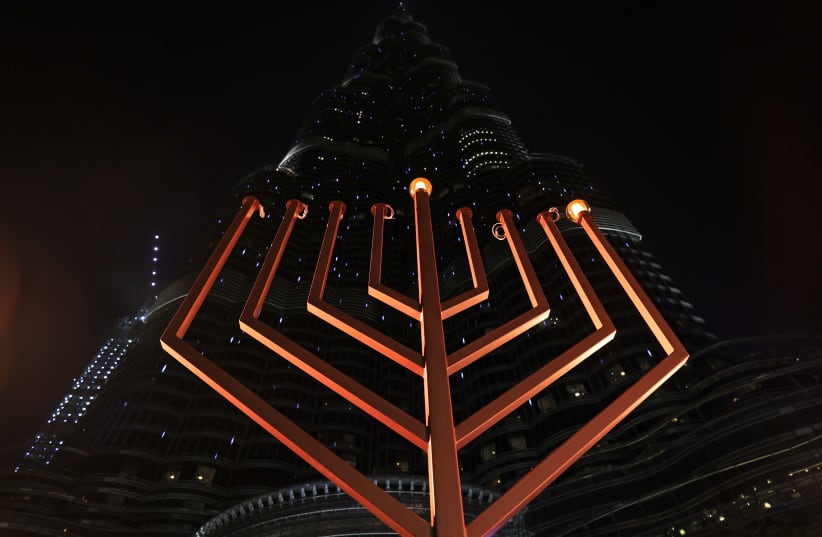Tourism Minister Orit Farkash-Hacohen participated in the first Israeli-Dubai Tourism forum on Wednesday and said that the roughly 50,000 Israelis currently in the UAE are “lighting Hanukkah candles freely” and by doing so, “topple walls” between the two countries.
“Once the world will begin to wake up after COVID-19 is over, with God’s help, we expect to get 100,000 Emirates tourists per year,” she said.
There are currently 25 weekly flights between Israel and the UAE, “and the more the merrier,” she joked. She added that she asked her UAE counterpart if Israelis are “behaving well” in his country and he assured her that they were.
Hundreds of UAE and Israeli travel agencies, hotel managers and travel writers participated in the digital event to learn about the attractions of the Holy Land and to solve practical issues concerning visas and flights.
The ministry is currently working on an improved Arabic online version, and an Israeli booth is set to open in May during the Arabian Travel Market event in Dubai. The ministry is also training Arabic-speaking tour guides with the hope Israel could become “a home away from home to all the Emirates,” the minister added.
The audience was shown exciting films with an Arabic-inspired soundtrack introducing Jerusalem, Tel Aviv, Acre, Eilat and the Dead Sea to a global audience. The multi-cultural aspects of the country were emphasized as it is the spiritual home to five faiths: Judaism, Christianity, Islam, Druze and Bahai. Arabic was presented as an official language second only to Hebrew.
While Jerusalem – the city 80% of all tourists visit during their stay – received a great deal of attention, other cities were also presented.
The film about Acre included an original scene with a crusader playing the lute. Tel Aviv was presented as a city with 1,748 bars, clubs and coffee shops – a figure reached before the novel coronavirus led to a slump in the service industry. Eilat was described as a unique location where one may swim with dolphins. The UAE tourism professionals praised the films and asked to be sent copies to share with potential clients.
Ministry official Ksenia Kobyakov mentioned that Eilat dolphins are also tourists, having arrived in Israel from the Black Sea. Originally trained by the Russian Army, the original pod was brought to Eilat in the 1990’s – the current dolphins are their descendants.
As a Start-Up Nation, Israel hopes to benefit from the new trend of MICE – Meetings, Incentives, Conferences and Exhibitions – once flights reopen on a larger scale. This tourism module is uniquely suited to promote Israeli science, technology, and cultural events once COVID-19 vaccines are widely distributed.
One concept discussed was how Australian tourists might visit both the UAE and Israel in greater numbers as the Abraham Accords offer Oceania better flights to visit both countries.
The theme most touched upon was how Israel is a country of contrasts, a modern state with an ancient history; a religious society which also has a secular life beat.
Farkash-Hacohen took questions at a later session and was asked to touch on many different topics, from the availability of Halal dining options to visa issues and ending with the personal safety of women traveling in Israel.
The minister said Israel is as safe as any country in the EU but added that “speaking as one woman to the other” she suggests single female tourists don’t walk around at 3 a.m. to a club without at least one other female friend present.
She pointed to how kosher food practices and Islamic dietary habits are similar, which is why devout Muslims are able to eat kosher food if no halal food is available, but also said that halal food is easily obtainable in Arab communities across the country.
As the UAE has many expats living within it, the visa issue is divided into two parts. UAE citizens won’t need a visa to enter Israel starting from January. The tourist route of a non-UAE citizen living in that country, such as an Indian national or a Filipino, will be based on what their country of origin and Israel agree upon.
Indian citizens require a visa but Filipinos, unless they have a family member working in Israel, do not.
An Israeli consulate is set to open in the UAE soon. One of its functions will be to issue visas to facilitate travel. One question, about Pakistani citizens living in the UAE, was left unanswered.
